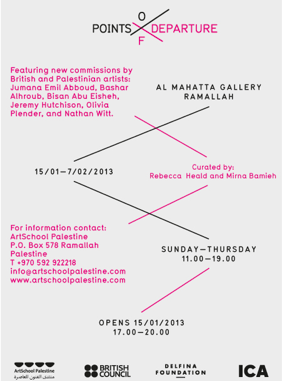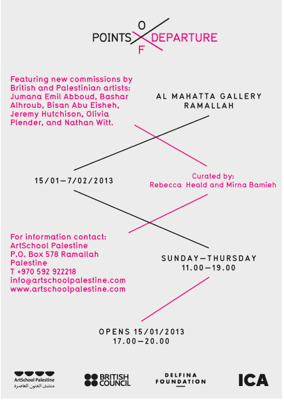
Points of Departure, a group exhibition is presented by The British Council & ArtSchool Palestine. This exhibition and public programme culminates a year of collaboration with Delfina Foundation, and the Institute of Contemporary Arts (ICA), London.

The first outcomes of Points of Departure will be presented in Ramallah in January and February 2013 before travelling in an expanded form to the ICA, as one of the highlights of the next Shubbak Festival in London, summer 2013.
Points of Departure features new commissions resulting from six residencies in London and Ramallah by British and Palestinian artists:Jumana Emil Abboud, Bashar Alhroub, Bisan Abu Eisheh, Jeremy Hutchison, Olivia Plender, and Nathan Witt. Devised with two curators-in-residence, Mirna Bamieh and Rebecca Heald, the works in Points of Departure are a thoughtful exploration of the anthropological concept of liminality. From the Latin word l?men, meaning ‘a threshold’, liminality is a condition in which one’s sense of identity is diffused, leading not only to states of dislocation and disorientation, but also to the possibility of new perspectives. Residencies can also be understood as a ‘liminal’ state between time and place. But what happens when the liminality of the residency is entwined with a place like Palestine, which is defined by its own political ambiguity and contestation?
In the face of globalisation, but without succumbing to false universalism, all Points of Departure artists undertook varieties of research to reveal a range of partial truths. At the ICA, they will be presented in different mediums including performance, video, installation, drawings, and intervention.
Titian’s Noli me tangere is the starting point for Jumana Emil Abboud.Using Anglo-Saxon and Palestinian versions of the fairytale, The Girl without Hands, she creates an installation in which to consider on one level the body and sensations of touch, and on another, the cultural dismemberment that interferes with the development of human beings.
Bashar Alhroub continues his distinctive investigation into the relationship between memory and place. For this project, in video and collage he presents the site of literal residency (the Delfina House) as immensely evocative and personal.
In Welcome to Palestine, Bisan Abu-Eisheh rediscovers his daily routes through the British resident artists’ experience of Palestine; in a “re-mapping” exercise he explores codes and modes of travel and movement, those of a local and those of a foreigner.
Through the manipulation of manufacturing and commercial modes of production, Jeremy Hutchison engages in what he terms “rituals of sense-making”. Collaborating with employees in factories and supermarkets, he designs situations that embrace confusion and propose alternative kinds of logic.
Over the time she spent in Palestine, Olivia Plender was absorbed with questions related to historical narration and the absence of archives and museums in the West Bank. Now, with local actors she is working on a series of game-like improvisation exercises that explore invisibility as a metaphor.
When he started his residency in Ramallah, Nathan Witt set his Google Calendar to include Islamic Hijri, Hebrew Ha’luach and Christian Gregorian calendars. Over the last six months this calendar has been shared, posing questions about existing within three separate religious time zones.
Related research and new knowledge on the theme of liminality will be incorporated into the exhibition catalogue. The exhibition will be also be complemented with a public programme of talks.
Visitor information
Opening days/times: 15 January – 7 February(Sun-Thu, 11:00—19:00)
Address: Al Mahatta Gallery, Near Bank of Palestine, Ramallah

Leave a Reply